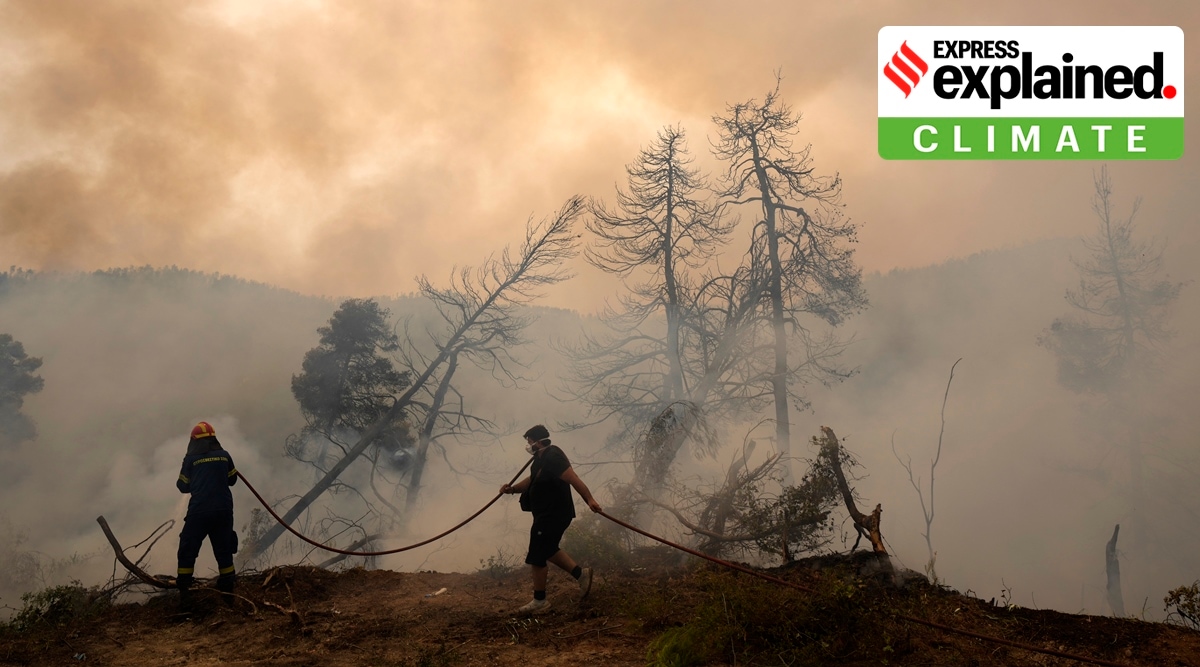Explained: Why we need to worry about the wildfires raging in Greece
Greece wildfires: The worry is exacerbated especially because these wildfires seem to be coming closer to civilisation, damaging buildings and forcing mass evacuations.
 A firefighter tries to extinguish the flames as a local resident holds a water hose during a wildfire at Ellinika village on Evia island, about 176 kilometers (110 miles) north of Athens, Greece, Monday, Aug. 9, 2021.(AP)
A firefighter tries to extinguish the flames as a local resident holds a water hose during a wildfire at Ellinika village on Evia island, about 176 kilometers (110 miles) north of Athens, Greece, Monday, Aug. 9, 2021.(AP)Thousands of people have fled parts of Greece due to raging uncontrolled wildfires. Wildfires, or bushfires in Australia, are unplanned fires that burn through natural areas such as forests, grasslands or prairies.
While wildfires are common in some parts of the world during the summer season, concern is rising about recent such blazes that have wreaked havoc in western US and now the Mediterranean. The worry is exacerbated especially because these wildfires seem to be coming closer to civilisation, damaging buildings and forcing mass evacuations.
Wildfire basics
Around the world, wildfires or forest fires occur during hot and dry seasons. Since dry leaves, shrubs, grass and deadwood are easily combustible, they are easy to ignite. Ignition can either happen naturally, such as through lightning strikes, or triggered accidentally, such as from cigarette stubs.
Sometimes, however, ignition can be intentional, such as to clear land or to control an incoming forest fire by removing vegetation that would provide more fuel to it. Such fires typically come to an end when there is no more vegetation to burn or because of rain.
 A firefighter from Slovakia cools himself down during a wildfire in Avgaria village on Evia island, about 184 kilometres (115 miles) north of Athens, Greece, Tuesday, Aug. 10, 2021. (AP)
A firefighter from Slovakia cools himself down during a wildfire in Avgaria village on Evia island, about 184 kilometres (115 miles) north of Athens, Greece, Tuesday, Aug. 10, 2021. (AP)
As the fires burn through vegetation or forests, smoke and carbon are released into the atmosphere. But the fires also release nutrients into the soil and are an important part of ecological succession, plant germination, and soil enhancement, NASA notes. The size of a wildfire depends on the amount of vegetation available and also the strength and direction of the wind.
Apart from Greece and the US, Turkey also experienced wildfires that saw authorities ordering mass evacuations. Turkish President Tayyip Erdogan has called them the worst wildfires the country has experienced, while the Greek prime minister Kyriakos Mitsotakis has apologised for “weakness” in responding to the wildfires.
What’s the situation in Greece right now?
As per local media in Greece as of Tuesday, a massive wildfire continues to burn on the northern tip of Greece’s second-largest island called Evia, which is close to the mainland. The fire started on August 3 and has destroyed most of the island’s northern part.
Kathimerini reported that the fire has destroyed homes and businesses and has led to the evacuation of dozens of villages. These fires, described by Mitsotakis as “a natural disaster of unprecedented proportions” , have also destroyed large parts of forests in the affected areas.
This is, however, not the only wildfire in Greece — there are several others active in the country. One of the most significant wildfires is in the southern Peloponnese region.
On Tuesday, the Greek newspaper Ta Nea reported that the fire in northern Evia is taking a new turn, where strong winds created a large front for the already raging blaze near the Pefki municipality.
Because of the damage, these wildfires have caused, Greece’s cabinet is preparing to announce support for the victims. Kathimerini also reported that Greece is experiencing its worst heatwave in three decades, which has sent temperatures up to 45 degrees and “turned its prized pine forests into bone-dry tinderboxes.”
The concern about wildfires
It is hard to pinpoint the exact source of a wildfire. In Greece, which experiences hot dry weather, wildfires are not unusual.
But the latest report of the Intergovernmental Panel on Climate Change (IPCC) has flagged – like the reports before this one – weather events such as frequent heatwaves, extreme rainfalls and rising sea levels. Some of these factors can influence the way wildfires play out.
 A burned bed and a lamp are seen in a burned house after a wildfire in Kastri village on Evia island, about 188 kilometres (117 miles) north of Athens, Greece, Monday, Aug 9. 2021. (AP)
A burned bed and a lamp are seen in a burned house after a wildfire in Kastri village on Evia island, about 188 kilometres (117 miles) north of Athens, Greece, Monday, Aug 9. 2021. (AP)
For instance, a global increase in average temperatures can lead to more intense heat waves. Therefore, increasingly warm and dry weather conditions resulting from climate change can lead to more extreme fires and more extreme fire seasons.
This is what a review of scientific articles that tried to establish a link between climate change and fire risk published since January 2020 noted as well. The review made the observation that human-induced climate change promotes the conditions on which wildfires depend, enhancing their likelihood and challenging suppression efforts.
Guillermo Rein, Professor of Fire and Science at the Imperial College London, told the Science Media Centre that while summer is part of the expected wildfire season in North American and Europe, “it is the significant increase in the number of large wildfires” in the US and Mediterranean that is worrying.
Rein also said that there can be both good and bad wildfires and what the world is seeing right now are more and more bad wildfires, considering that thousands of people have been evacuated, and homes and businesses destroyed. The wildfire season that the state of California in the US experienced last year was one of the worst, with over 100,000 people forced to evacuate and millions of acres of land destroyed.
- 01
- 02
- 03
- 04
- 05






































